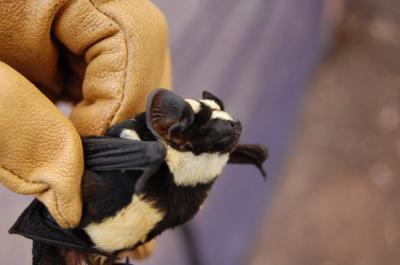Researchers visiting South Sudan identified a new genus of bat after discovering a rare specimen and determining the bat was the same as one originally captured in nearby Democratic Republic of the Congo in 1939 and named Glauconycteris superba but that it did not fit with other bats in the genus Glauconycteris.
They placed this bat into a new genus - Niumbaha. The word means "rare" or "unusual" in Zande, the language of the Azande people in Western Equatoria State, where the bat was captured. The bat is just the fifth specimen of its kind ever collected, and the first in South Sudan, which declared independence in 2011.
Bucknell Associate Professor of Biology DeeAnn Reeder and Fauna&Flora International (FFI) Programme Officer Adrian Garside were leading a team conducting field research and pursuing conservation efforts when Reeder spotted the animal in Bangangai Game Reserve.
"My attention was immediately drawn to the bat's strikingly beautiful and distinct pattern of spots and stripes. It was clearly a very extraordinary animal, one that I had never seen before," recalled Reeder. "I knew the second I saw it that it was the find of a lifetime. After careful analysis, it is clear that it doesn't belong in the genus that it's in right now. Its cranial characters, its wing characters, its size, the ears — literally everything you look at doesn't fit. It's so unique that we need to create a new genus."
"To me, this discovery is significant because it highlights the biological importance of South Sudan and hints that this new nation has many natural wonders yet to be discovered. South Sudan is a country with much to offer and much to protect," said Matt Rice, FFI's South Sudan country director.

New bat species Niumbaha superba. Credit: DeeAnn Reeder, Bucknell University
"Our discovery of this new genus of bat is an indicator of how diverse the area is and how much work remains," Reeder added. "Understanding and conserving biodiversity is critical in many ways. Knowing what species are present in an area allows for better management. When species are lost, ecosystem-level changes ensue. I'm convinced this area is one in which we need to continue to work."
Published in ZooKeys.






Comments